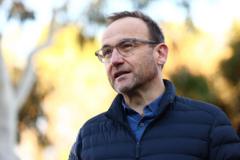José Mujica, the celebrated former president of Uruguay, known as the "poorest president" for his simple lifestyle, has passed away at the age of 89. His successor, President Yamandú Orsi, announced the news via social media, paying tribute to Mujica's deep love for his nation. Although his cause of death has not been officially reported, Mujica had been battling oesophageal cancer.
José Mujica, the World’s ‘Poorest President,’ Passes Away at 89

José Mujica, the World’s ‘Poorest President,’ Passes Away at 89
Former Uruguayan President José Mujica, known for his humble lifestyle and impactful policies, has died at age 89, leaving a profound legacy.
Mujica served as the president from 2010 to 2015 and became a symbol of humility in leadership, promoting significant social reforms, including Uruguay's groundbreaking legalization of recreational marijuana. His lifestyle choices, which included residing in a modest home instead of the presidential mansion, resonated widely and propelled him to international fame, despite Uruguay's relatively small population of approximately 3.4 million.
Born to a middle-class family, Mujica's political journey was shaped by his early activism, especially his involvement with the Tupamaros National Liberation Movement in the 1960s. He was imprisoned for over a decade during the military coup of 1973, where he endured torture and isolation. Mujica often reflected on his freedom as a more significant achievement than his presidential title.
After being released in 1985, he became a prominent political figure, eventually leading the leftist coalition, the Frente Amplio, and serving as Uruguay's Minister before his presidency. Under his leadership, the Uruguayan economy thrived with significant growth, and several progressive social laws were introduced, placing him in the global spotlight alongside leaders like Lula da Silva and Hugo Chávez.
Despite his popularity, Mujica faced criticism for increasing public spending and failing to adequately address educational reforms during his administration. Yet, he remained untainted by corruption allegations, holding high approval ratings throughout his presidency.
Retiring from politics in 2020, Mujica remained a respected figure in Uruguay, often reflecting on life and death with wisdom. He met his end with acceptance, viewing it as part of the natural course of life. His legacy, marked by a call for simplicity and a critique of consumerism, continues to inspire many in Latin America and beyond.
Born to a middle-class family, Mujica's political journey was shaped by his early activism, especially his involvement with the Tupamaros National Liberation Movement in the 1960s. He was imprisoned for over a decade during the military coup of 1973, where he endured torture and isolation. Mujica often reflected on his freedom as a more significant achievement than his presidential title.
After being released in 1985, he became a prominent political figure, eventually leading the leftist coalition, the Frente Amplio, and serving as Uruguay's Minister before his presidency. Under his leadership, the Uruguayan economy thrived with significant growth, and several progressive social laws were introduced, placing him in the global spotlight alongside leaders like Lula da Silva and Hugo Chávez.
Despite his popularity, Mujica faced criticism for increasing public spending and failing to adequately address educational reforms during his administration. Yet, he remained untainted by corruption allegations, holding high approval ratings throughout his presidency.
Retiring from politics in 2020, Mujica remained a respected figure in Uruguay, often reflecting on life and death with wisdom. He met his end with acceptance, viewing it as part of the natural course of life. His legacy, marked by a call for simplicity and a critique of consumerism, continues to inspire many in Latin America and beyond.






















